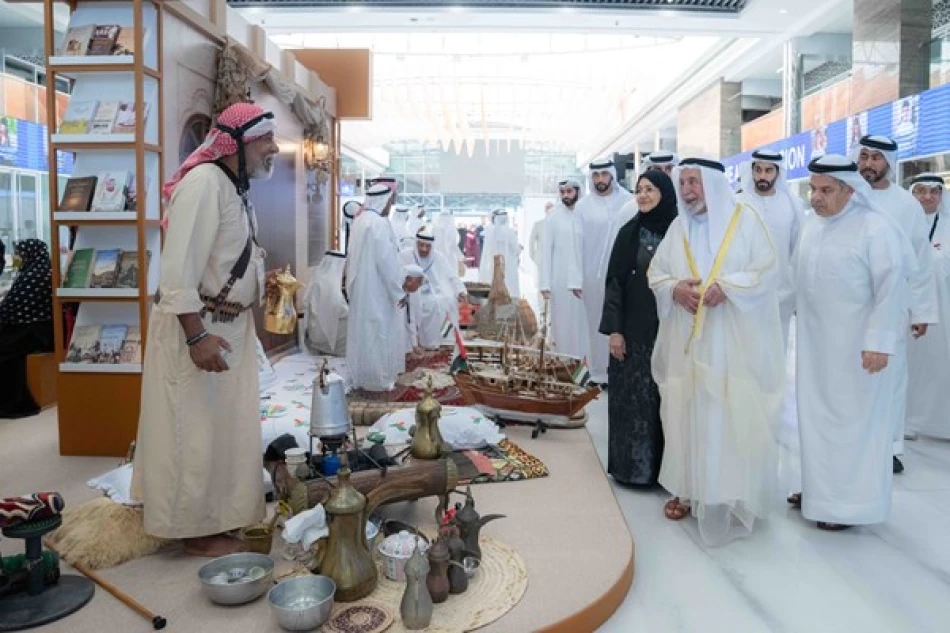
Sharjah Ruler Inaugurates the 18th Edition of the Global "We Are Inclusion" Conference
Sharjah Becomes First Middle East Hub for Global Inclusion Conference, Signaling Region's Disability Rights Evolution
The UAE's Sharjah emirate has positioned itself as a regional leader in disability rights advocacy by hosting the 18th edition of the Global Conference "We Are Inclusion 2025" — the first time this prestigious international event has been held in the Middle East and North Africa. With 152 speakers from 74 countries representing 160 organizations, the four-day conference marks a strategic shift toward inclusive governance models in a region traditionally lagging behind Western standards for disability integration.
Strategic Positioning in Global Inclusion Movement
Sheikh Dr. Sultan bin Muhammad Al Qasimi, Ruler of Sharjah, inaugurated the conference at Sharjah Expo Centre, underscoring the emirate's commitment to becoming a model for inclusive societies in the Arab world. The event, organized by Sharjah City for Humanitarian Services with strategic support from the Sharjah Government Media Bureau, occurs every four years and represents the most significant gathering of Inclusion International — an organization with over 60 years of advocacy for people with intellectual disabilities.
This timing is particularly significant as Middle Eastern governments face increasing pressure to modernize their social policies and align with international human rights standards. The conference's 59 dialogue sessions provide a platform for self-advocates, families, and policymakers to address gaps that have historically marginalized people with disabilities in the region.
Beyond Symbolism: Real Policy Impact
Sheikha Jamila bint Mohammed Al Qasimi, President of Sharjah City for Humanitarian Services, emphasized that inclusion represents "an essential part of our established values" rather than merely an aspirational goal. Her recorded address highlighted Sharjah's four-decade journey in disability rights, positioning the emirate as a global example of comprehensive accessibility and dignity for all citizens.
The conference agenda tackles concrete policy challenges including closing institutional care facilities, simplifying information access for people with disabilities, and ensuring barrier-free environments. These discussions directly address the International Convention on the Rights of Persons with Disabilities, focusing on equality, non-discrimination, independent living, community integration, and employment opportunities.
Regional Collaboration and Knowledge Transfer
Notable participation from regional leaders, including Sheikh Mohammed bin Daij Al Khalifa, President of the Paralympic Committee in Bahrain, and Prince Mired bin Raad bin Zayed Al Hashemi, Chairman of Jordan's Higher Council for the Rights of Persons with Disabilities, suggests growing momentum for cross-border cooperation on disability rights in the Arab world.
Hashim Taqi, President of Inclusion International for the Middle East and North Africa, praised Sharjah's efforts to amplify the voices of self-advocates and their families globally, indicating the conference's potential to influence policy frameworks across the region.
Investment and Economic Implications
From an economic perspective, Sharjah's leadership in disability inclusion represents a calculated investment in human capital development. Countries that successfully integrate people with disabilities into their workforce typically see productivity gains and reduced social service costs over time. Singapore and parts of the EU have demonstrated how inclusive policies can drive innovation and economic competitiveness.
Sue Swenson, President of Inclusion International, noted that Sharjah has become a "global model to be emulated" in this field, suggesting potential for the emirate to export its expertise and attract international organizations focused on inclusive development.
Measuring Success Against Global Standards
The conference's emphasis on self-advocacy training and decision-making skills reflects a shift from traditional charity-based approaches to rights-based models that have proven more effective in countries like Canada and New Zealand. The focus on closing institutional facilities aligns with global trends toward community-based support systems, which typically cost less while providing better outcomes for individuals with disabilities.
James Cook, Executive Director of Inclusion International, described the conference as a "unified platform for visions and values" that could strengthen cooperation networks and achieve shared objectives through committed implementation of conference recommendations.
Long-term Regional Transformation
Sharjah's hosting of this conference signals broader changes in Middle Eastern approaches to social policy and human rights. As regional governments compete for international recognition and investment, disability inclusion has become a measurable indicator of societal progress and governance quality.
The conference's outcomes will likely influence policy development across participating countries, potentially accelerating adoption of inclusive education systems, accessible infrastructure, and employment integration programs. For international investors and organizations evaluating regional partnerships, such initiatives demonstrate institutional capacity for implementing complex social policies — a factor increasingly important in ESG-focused investment decisions.
Most Viewed News

 Layla Al Mansoori
Layla Al Mansoori






